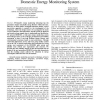Free Online Productivity Tools
i2Speak
i2Symbol
i2OCR
iTex2Img
iWeb2Print
iWeb2Shot
i2Type
iPdf2Split
iPdf2Merge
i2Bopomofo
i2Arabic
i2Style
i2Image
i2PDF
iLatex2Rtf
Sci2ools
129
click to vote
IOT
2010
2010
DEHEMS: A user-driven domestic energy monitoring system
Persuasive energy monitoring technology has the potential to inspire sustainable energy lifestyles within the home. However, to effect positive ecological behaviour change, a more user-driven approach is needed for the development of the technology, where the design needs to be accompanied by study on user behaviours and motivations, and the prototype deployed and tested on large sample sizes to understand user preferences. We present DEHEMS, a wide-scale energy monitoring system that undergoes three cycles of design, development and usability assessment so that it can help facilitate energy literacy and environmental awareness based on user preferences. Through real-world deployment, survey and focus group studies carried out in the UK, we present motivations and constraints for saving energy, user assessment of the DEHEMS pilot system and identify some critical user expectations and concerns. We describe how the usability analysis is then incorporated into the design of the next gene...
| Added | 13 Feb 2011 |
| Updated | 13 Feb 2011 |
| Type | Journal |
| Year | 2010 |
| Where | IOT |
| Authors | Vasughi Sundramoorthy, Qi Liu, Grahame Cooper, Nigel Linge, Joshua Cooper |
Comments (0)

